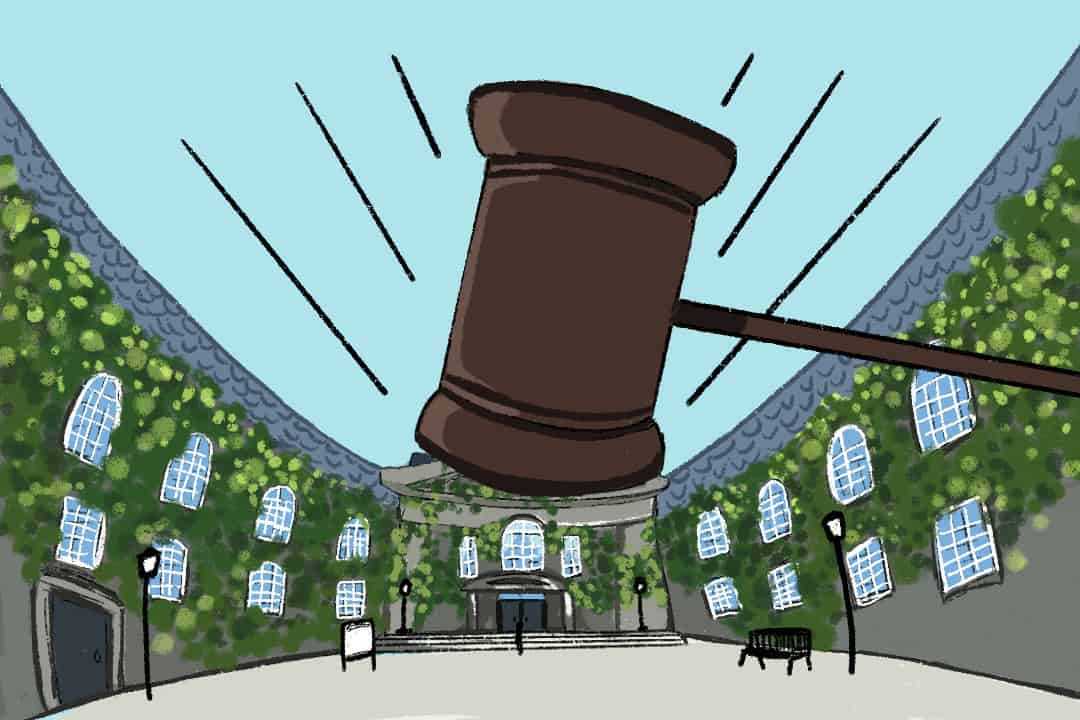Anyone can go online and access the case records of U of T’s University Tribunal, where the university prosecutes students accused of academic misconduct — plagiarism, cheating on exams, things like that. Since 2000, the tribunal has processed 578 cases, with only nine cases that resulted in a not-guilty verdict. This puts the University Tribunal’s conviction rate at 98.4 per cent.
I would expect to see this high of a conviction rate in an authoritarian regime, not a premier global research institution. In many of the tribunal hearings, students receive no defence, and the standards to prove a student’s guilt is shockingly low. Therefore, at U of T’s academic tribunal, I believe students are set up to fail.
Proof
The University Tribunal doesn’t follow the same standard of proof as a regular criminal court, but a civil court. Thus, at the University Tribunal, guilt is determined on ‘a balance of probabilities.’ This means the judges ask themselves whether it seems “more likely than not” that the accused is guilty. How I see it is if you seem 50.1 per cent likely to be guilty — but 49.9 per cent innocent — that’s it. You’re convicted.
An essential component of any fair trial is that the accused can present their perspective and have a competent argument made in their defence through a lawyer. However, my calculations show that only 42.4 per cent of students who appeared in trials for tribunal cases from the 2023–2024 academic year had legal representation.
I should note that all students can access free legal representation through Downtown Legal Services: U of T Faculty of Law’s community legal clinic. However, The Varsity reported in 2021 that a university registrar warned a student against seeking legal representation by suggesting that the university would respond unfavourably to students who do so.
The University Tribunal’s information page emphasizes that students are not required to seek legal representation, noting that they’re “accustomed to having students attend without [it].” Meanwhile, the university hires pricey corporate lawyers to lead its own prosecutions.
This seems to me like a terrible imbalance. If 60 per cent of defendants in Canada’s criminal courts had no legal representation, I bet that there’d be a 98.4 per cent conviction rate there too.
Absence
Only about 39.4 per cent of accused students in the 2023–2024 tribunal cases were present for their hearing. The university does make an effort to ensure attendance by calling and sending multiple emails before scheduling the trial. While these absences may not be entirely the university’s fault, it is still a major problem.
When a student is absent without legal representation, the hearing proceeds without them. This means the tribunal only hears one side of the story and forms decisions on an impaired basis.
If the university cannot directly resolve these absences, it should at least try to account for it by maintaining a high standard of proof, being cautious to convict, and exercising restraint in punishments. On all counts, however, it seems to me that they do the opposite.
Penalty
The tribunal’s most common punishment last academic year was a five-year suspension. I’m sure that taking a gap in the middle of your studies, without having earned a degree yet, would throw a wrench into anyone’s life. It could even jeopardize international students’ immigration status.
Most cases of academic offences don’t actually end up at the tribunal. First, the student meets with the instructor of the course. If the case is not resolved, the student meets their department and then their faculty — who either dismisses the accusations or imposes light penalties. The cases sent to the tribunal are the more serious ones and are those where the accused student repeatedly pleads innocence.
If you are innocent and you insist on it every step of the way — but the university does not believe you — your case will be sent to the tribunal, with its 98.4 per cent conviction rate.
Threat
A 2022 article from Ultra Vires, U of T Faculty of Law’s student newspaper, describes how a dean’s designate threatened a student with a drawn-out tribunal process to pressure them into pleading guilty.
Among the 2023–2024 University Tribunal cases, the average time between the date of an alleged academic offence and the tribunal hearing was nearly 22 months — excluding a seven-year case in which a PhD candidate was accused of academic misconduct five years after submitting her thesis and another on-going case where the student is appealing the verdict.
If a student wanted to prove their innocence but was set to graduate, their graduation would be postponed until the tribunal hearing was concluded. If I were in that position, I’d feel pressured to plead guilty too.
Along with the story of the registrar and the consequences of seeking legal representation, I see a disturbing pattern. Students have been guided by university administrators to fear the tribunal long before they ever face it, pressuring them to plead guilty out of fear. Even if only a fraction of students with a case appear before the tribunal, its dysfunction is felt all the way down.
Students should not cheat. At the tribunal though, it may not matter whether you actually do or not since you’re judged on such a low standard of proof. I think it’s only a matter of time before we see a wrongful conviction — assuming there haven’t been any already. Something needs to change, and until it does, we should all be worried.
Devin Botar is a third-year student at St. Michael’s College studying history.
Editor’s Note (September 26, 01:45 pm): A previous version of this article stated that the University Tribunal does not follow the same standard of proof as a regular court. In fact, the University Tribunal follows the standard of proof as a regular civil court.


